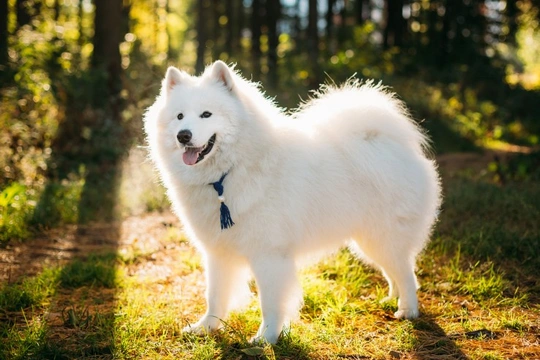
Vogt-Koyanagi-Harada in Dogs
Vogt-Koyanagi-Harada is a condition that is often also referred to as Uveo-Dermatological Syndrome (UDS). Studies have shown that certain breeds appear to be more predisposed to suffering from the condition than others although why this is so remains a bit of a mystery. As such, more research is needed into understanding Vogt-Koyanagi-Harada in dogs and why some breeds are more at risk than others.
Breeds Most at Risk
As previously mentioned studies have established that certain breeds appear to be more at risk of developing VKH than others and this includes the following breeds:
- Samoyeds
- Irish Setters
- Golden Retrievers
- Chow Chows
- Shetland Sheepdogs
- Siberian Huskys
- Old English Sheepdogs
- Saint Bernards
- Japanese Akitas
Symptoms Associated with the Condition
When dogs suffer from the condition there are certain symptoms that present themselves and this includes the following:
- Vitiligo - skin depigmentation
- Poliosis - whitening of hair
- Uveitis - eye problems
- Severe conjunctivitis
When dogs suffer from the condition, they all too often end up going blind thanks to the fact they suffer from such severe and painful conjunctivitis which results in their retinas becoming detached. However, some dogs only suffer mild symptoms and their vision is not so seriously and negatively impacted and if treated early enough, unlike in humans, a dog's retina can reattach itself which means partial vision can be restored. The bad news is the problem is known to be recurring and as such, a dog's retina can become detached again causing more damage which means as time goes on, their vision gradually worsens and eventually dogs may lose their sight.
The loss of pigmentation in a dog's skin around their eyes, muzzles and backsides also eventually becomes scabby and crusty. This can lead to sores and painful ulcers developing which need veterinary care on an ongoing basis.
Treatment Options
Because the exact cause of the condition remains unknown and why some dogs appear to be more predisposed to developing VKH than others, treating dogs with the condition can prove challenging. With this said, it is thought there may be a genetic link in that some dogs are more at risk thanks to them possessing a recessive gene, but more research is needed to confirm this is so.
Diagnosing the Condition
Any dog suspected of suffering from the condition needs to be examined by a vet sooner rather than later so a quick diagnosis can be made and a treatment set in place. A vet would typically refer dogs to a veterinary ophthalmic specialist who would be in a better position to assess their condition before recommending the best treatment option. Most dogs with VKH need long term treatment with the end goal being to reduce the risks of them suffering further episodes.
Living with a Dog with VKH
It is worth noting that dogs cannot be cured when they suffer from the disorder, but their condition can be managed with the right drugs and medication. Providing a dog responds well to a treatment, they can have a good quality of life but the supportive care needed is all-important for the remainder of their lives.
With this said, many of the drugs used to manage VKH have side effects which includes negatively impacting a dog’s immune system which leaves them open to picking up infections and other diseases more easily. As such, it is essential for dogs that are known to suffer from the condition to be taken for regular health checks. This allows a vet to reassess a dog’s condition and to alter any medication should this be deemed necessary.
Responsible Breeding is Essential
Responsible breeders would never use a dog that's known to suffer from VKH in a breeding programme. Any dog with the condition should be either spayed or neutered to prevent them from being used for breeding purposes. This is the only way of reducing the risk of the condition being passed on to offspring should it be proven that there is a genetic link responsible for dogs inheriting the disorder.
Prognosis
Most dogs can go on to lead a good quality of life providing they respond well a treatment that a vet has set in place. However, it is worth noting that quite a few dogs are put to sleep not because they are suffering from Vogt-Koyanagi-Harada, but rather because the side effects of drugs they are given to manage the disorder are so severe.



